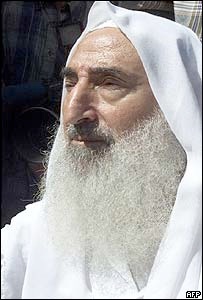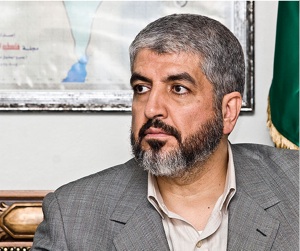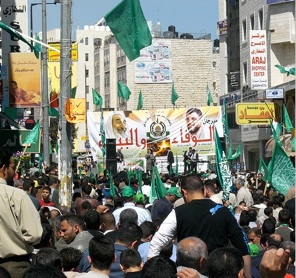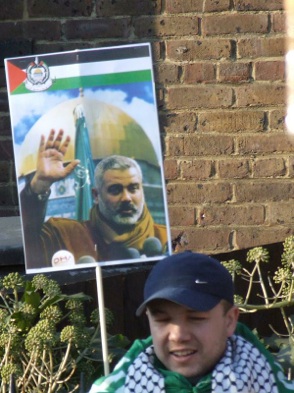Hamas

Founded by Sheik Ahmed Yassin at the beginning of the first intifada in 1987, Hamas arose out of the Moslem Brotherhood movement in Egypt and is (as are Moslem Palestinians generally) Sunni Moslem. Unlike for example al-Qa’ida, a secret, small-cell organisation, Hamas is a grassroots organisation. Since 1992 it has had a military wing. There is a distinct difference between on the one hand the rhetoric of its constitution (the status of which has become unclear) and on the other hand its pragmatic realism. The constitution (see box) claims the whole of the land of Palestine as sacred Moslem territory (much as do many right-wing Israelis for Jews one may say). But in practice in recent years Hamas has consistently professed itself ready to negotiate a long-term, even permanent, truce or hudna with Israel on the ‘green line’ (1948-67 border). If Hamas refuses formally to recognise Israel (an American condition for Hamas to be included in negotiations), it has to be said that nor has Israel recognised an independent Palestinian state - and meanwhile (unlike Hamas) Israel is engaged in an illegal military occupation. Hamas has shown itself to abide by its word; see the intelligence report from the autumn of 2008 (History and Background).
Hamas’ politics (and the support it has garnered) has been - one may think quite understandably - a response to what has befallen the Palestinian people. Had Israel and the U.S. but grasped the opportunity provided by the first intifada and, in the early 1990s, allowed Palestinian aspirations to be satisfied through the creation of a fully autonomous Palestinian state on the 22% of mandate Palestine left to the Palestinians (instead of the humiliating climb down into which the Palestinians were forced by the Oslo process), the story might have been very different. Hamas is anti-American and (given what has been the Palestinian experience) opposed to peace deals brokered by the U.S. Sheik Ahmed Yasser commented: ‘There can be no dialogue between a party that is strong and oppressive and another that is weak and oppressed. There can be no dialogue except after the end of oppression.'
It may strike one that the reaction that there has been to Hamas’ rockets (see box) has been badly skewed. These in large part home-made rockets (lamp posts and Carnation tins have been pressed into service) are in no way accurate and many have come down on the Gazan side of the border, though latterly Hamas was able to send them further. To compare this with the overwhelming fire power which has been unleashed at the Gazans by Israel, backed by the U.S., must be to lack any sense of proportion. The figures speak for themselves (see the table under Gaza). Yes Hamas has ‘smuggled’ weapons through the tunnels from Egypt, but Israel has freely imported millions of dollars worth of sophisticated weaponry. Israel is a state, so it ‘imports’; the Palestinians are not allowed to be a state, so the comparatively minor amount of ammunition the Gazans succeed in importing is defined by the international community as ‘smuggling’.
Hamas has indeed in the past resorted to suicide bombing. What else - one may well say - was left to them if they were not simply to submit to the fate that Israel wishes to impose on them? This tactic had been successfully used by Hezbollah to drive the IDF out of southern Lebanon. The Israeli historian Ilan Pappé tells us, interestingly: ‘At first, the Hamas military wing … had found it difficult to recruit potential martyrs. … By 2000, all this had changed. With 50% unemployment, constant Israeli blockading of the West Bank cities, an electric fence around the Gaza Strip, and no hope for a political solution, there was no longer any need for preachers and “senders”, only for a constant supply of explosives and hand-grenades. … Israel employed F-16s, Merkava tanks and Apache gunships: the Palestinians responded with suicide bombing.’ Suicide attacks ceased in 2005 and Hamas renounced them in April 2006.
Hamas has proved itself uncorrupt and effective in government (insofar as ‘effective government’ is possible in the appalling conditions of Gaza). 80%-90% of its budget and 90% of its work goes into schools, health-care and social services. It is this – and the fact that it alone is willing to stand up to Israel – which has lies behind the support it generates. In practice in government Hamas has shown itself not particularly extreme: it has appointed women judges (which strict Sharia law would not permit); though it is true that there has been very considerable pressure on women to don the hijab (headscarf) and women have tended to be taken out of the workplace and back into domesticity. Traditionally, Palestine is the most secular of Moslem societies and there is no reason to think that the many who support Hamas within the Palestinian territories at large will change in this regard.
Significantly, during the time I spent in Palestine/Israel with others (A-Z) no one admitted to us that they supported Hamas! This is an extraordinary situation, given that when in 2006 the Palestinians were offered elections, which were free and fair, Hamas won a substantial majority. It should be recognised that much of the support for Fatah (and for the current PA administration) comes from those who are on its payroll (and ultimately the American payroll). The PA is widely regarded as a puppet government installed by Israel with the backing of the Americans. I heard the word ‘Quislings’ used, though Abbas has at times spoken his mind and is not simply a traitor. Significant also I found remarks made by a member of the (Israeli) Machsom watch (Checkpoints). Millions, she commented went into the pockets of Arafat and his friends: whereas Hamas is clean; it has tackled heath, infrastructure and there is no corruption.
There is little reason to think that Hamas would not be cooperative were the West willing to see negotiations take place on a reasonable basis. (Whither Now?) Many have pointed out that it is nonsensical for there to be ‘negotiations’ without a major player being included. After Obama’s ‘Cairo speech’ in June 2009, Haniyeh commented that the movement had ‘listened carefully’ to the apparent change in tone. The Hamas position seems to be that, were the Palestinians to be offered a state on the green line and, put to a referendum, and this were to be accepted by the majority of Palestinians, Hamas would accept this. One may well think it is for U.S and Israeli and policy to change. Indeed, the western world should be thankful that, in the face of all provocation, Hamas has remained so reasonable. If the West and Israel fail to deal with such a movement, it could well be thought that Hamas is likely to be replaced by something much more violent.
It is of course true that Hamas accepts some financial and military backing from Iran. Again, what else is it to do? The West has turned its back on the Gaza Strip. With the advent of a democratically elected Hamas government it withdrew financial aid (Background & History, 2006) and it has done nothing to challenge the illegal blockade maintained by Israel. (For the events of 2006/2007 resulting in Hamas’ take-over of Gaza that it might prevent a Fatah coup see David Rose’s article below.) It does not follow that the Gazan government particularly likes or is hand in glove with the Iranian government. I have heard Beverley Milton-Edwards (an expert on Hamas) remark: ‘Hamas has been compelled into relations that it might not otherwise have chosen.’ The West should note the results of its policy. Hamas’ largest financial backer is not Iran but Saudi Arabia.

Ismail Haniyeh
Prime Minister of the PA after Hamas won the 2006 elections and, after being forced out of office by the U.S. and Israeli-backed Fatah, now the de facto Prime Minister of Gaza. Born in a Gazan refugee camp, whence his parents had fled in the Nakba, he holds a degree in Arabic literature. Haniyeh was imprisoned for three years by the Israelis for participation in the First Intifada and subsequently deported to Lebanon. On returning to Gaza he became Dean of the Islamic University.
Further Reading
- ‘Hamas’, Wikipedia.
-
-Stephen Shalom, ‘Question and Answer on Gaza’. (Jan. 2009), downloadable here.
-
-Beverley Milton-Edwards & Stephen Farrell, Hamas: The Islamic Resistance Movement (Polity, 2010).
-
-David Rose, ‘The Gaza Bombshell’, Vanity Fair, April 2008.
Podcast
http://israelmuse.blogspot.com/2010/09/audio-beverley-milton-edwards-hamas-are.html
Interviews with Khaled Meshal
- New York Times (5 May 2009)
-
-Middle East Monitor (4 Sept. 2010)
Khaled Meshal
Meshal is Chair, Hamas Political Bureau based in Damascus (the top position in the movement). Born in a village near Ramallah, he has a BSc and taught in Kuwaiti schools. When living in Jordan he survived an assassination attempt by the Israeli Mossad acting under orders from Netanyahu.
The Hamas Charter
A concern which many abroad have had (and which Israel cites on every possible occasion) is the Hamas Charter (1988). This calls for the replacement of the state of Israel with a Palestinian Islamic state on what is now Israel, the West Bank and Gaza. Official Hamas statements have always been clear that the movement is not anti-semitic; the problem is usurpation by an Israeli state of Palestinian land.
The following is to be said:
-
(i)Hamas is not alone in claiming the whole land from the Mediterranean to the Jordan; the Israeli right does the same and much of the Israeli left connives in this.
-
(ii)In practice Hamas has shown itself to be wholly pragmatic (much more so than the present Israeli government), offering a truce on the 1948-67 border ‘green line’.
When involved in democratic, multi-party elections Hamas has sought to have a broad appeal. The former British ambassador to the UN Sir Jeremy Greenstock has commented (2009) that the charter ‘drawn up by a Hamas-linked imam some [twenty] years ago ... has never been adopted since Hamas was elected as the Palestinian government in 2006’. (Wikipedia). In an interview published in The New York Times (Whither Now?) in 2009 Kahled Meshal urged others to ignore the charter and judge Hamas by its actions. (Note: I have recently heard that there is some problem with formally recognising Israel on account of a religious belief related to the sacred Islamic site of the Haram al-Sharif: I should much value further information.)
Rockets
The rockets fired by Palestinian armed groups cannot accurately be directed at specific targets especially at longer distances. (AI ‘Fuelling Conflict’.) The military publication Jane’s Terrorism and Security Monitor has described the ‘Qassam’ rockets as: ‘inaccurate, short-range and rarely lethal’. According to Jane’s the ‘Qassam’ is a Palestinian improvised artillery weapon. (‘Rocket powered 'Hamastan' Jane’s Terrorism and Security Monitor, 11 July 2007, 29 June 2007.’) Amnesty International delegates have visited Sderot and Ashkelon police stations, where they saw the rockets which have struck the towns and surrounding areas, including Grads, Qassams and Quds. The latter two are very crude, rusty 60, 90, or 120mm pipes about 1.5 metres long with fins welded onto them. They can hold about five kilograms of explosives as well as shrapnel in the form of nails, bolts, or round metal sheets which rip into pieces on impact.
From June 2004 to the end of January 2009, 21 people in Israel were killed by rockets fired from the Gaza Strip, while over 3,000 Gazans, nearly a fifth of them children, were killed by the Israeli army and airforce. In 2008, the year before the Israeli onslaught on Gaza and in which the onslaught commenced, 7 Israeli citizens were killed by rockets fired from Gaza by Palestinian armed groups, 3 of them on Dec. 27/28/29 in response to the Israeli attack. In responding to the Goldstone Report, Hamas commented that they abide by sharia law, which respects human dignity, and that they had more than once urged (non-Hamas) Palestinian armed groups to refrain from attacking civilians. Hamas has commented (of hits on civilians): ‘We were targeting military bases, but the primitive weapons make mistakes.’
This may well be exactly right. In an interview Colonel Desmond Travers, the military expert on the Goldstone Committee, commented that he had inspected Hamas mortars and rockets ‘and they would have been highly imprecise’. Thus it could well be that Hamas was not intending to hit civilians; it could also be said that international humanitarian law forbids the killing of civilians and they knew their rockets were imprecise.
Flickr Commons: gw1’s photostream.
Ismail Haniyeh placard at Gaza Demo, London, 03.01.09

Wikipedia Commons: Trango
Khaled Meshal in an interview with Spanish journalists. (Further picture Whither Now?)

Wikipedia Commons: Hoheit
Hamas Election Rally in Ramallah
17 March 2007
The banner shows, to the left, Sheik Ahmed Yassin. Almost blind, and a paraphlegic, he was assassinated by the Israelis using a helicopter gunship as he left a mosque in 2004. 200,000 Palestinians attended his funeral procession.
